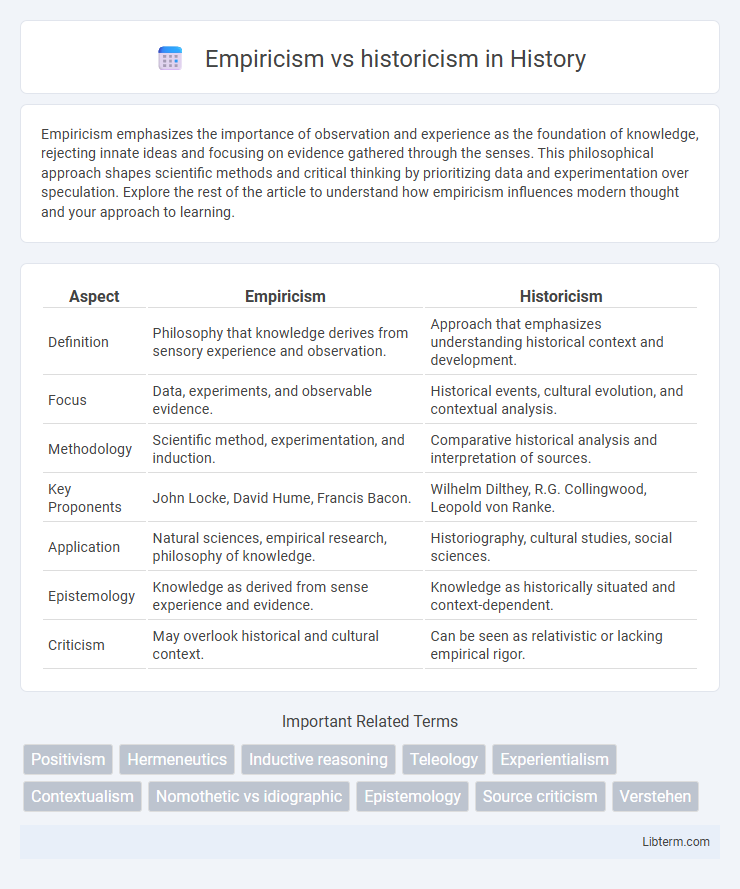Empiricism emphasizes the importance of observation and experience as the foundation of knowledge, rejecting innate ideas and focusing on evidence gathered through the senses. This philosophical approach shapes scientific methods and critical thinking by prioritizing data and experimentation over speculation. Explore the rest of the article to understand how empiricism influences modern thought and your approach to learning.
Table of Comparison
| Aspect | Empiricism | Historicism |
|---|---|---|
| Definition | Philosophy that knowledge derives from sensory experience and observation. | Approach that emphasizes understanding historical context and development. |
| Focus | Data, experiments, and observable evidence. | Historical events, cultural evolution, and contextual analysis. |
| Methodology | Scientific method, experimentation, and induction. | Comparative historical analysis and interpretation of sources. |
| Key Proponents | John Locke, David Hume, Francis Bacon. | Wilhelm Dilthey, R.G. Collingwood, Leopold von Ranke. |
| Application | Natural sciences, empirical research, philosophy of knowledge. | Historiography, cultural studies, social sciences. |
| Epistemology | Knowledge as derived from sense experience and evidence. | Knowledge as historically situated and context-dependent. |
| Criticism | May overlook historical and cultural context. | Can be seen as relativistic or lacking empirical rigor. |
Introduction to Empiricism and Historicism
Empiricism emphasizes knowledge derived from sensory experience and evidence gathered through observation and experimentation, forming the basis of scientific inquiry. Historicism centers on understanding historical context and cultural conditions to interpret events, ideas, and social phenomena authentically. These methodologies contrast empirical data analysis with context-driven interpretation, shaping distinct approaches in philosophy and social sciences.
Defining Empiricism: Core Principles
Empiricism centers on the principle that knowledge derives primarily from sensory experience and observable evidence, emphasizing experimentation and verification as crucial methods. It asserts that understanding is built through empirical data rather than innate ideas or theoretical speculation. Key proponents like John Locke and David Hume championed this approach, influencing scientific inquiry and the philosophy of knowledge with its reliance on evidence and experience over tradition or abstract reasoning.
Historicism Explained: Key Concepts
Historicism is a methodological approach emphasizing the importance of historical context in understanding ideas, events, and social phenomena, asserting that all knowledge is influenced by the time and culture in which it develops. This theory contrasts with empiricism by prioritizing the interpretation of historical processes and conditions over purely sensory data and experience. Key concepts of historicism include the rejection of universal truths, the emphasis on historical causality, and the belief that historical events must be studied within their unique temporal frameworks.
Philosophical Origins and Development
Empiricism traces its philosophical origins to early modern thinkers like John Locke and George Berkeley, emphasizing sensory experience as the foundation of knowledge, while historicism emerged from 19th-century German philosophers such as Wilhelm Dilthey and Leopold von Ranke, focusing on the context and development of historical events. Empiricism's development revolutionized scientific methodology by prioritizing observation and experimentation, whereas historicism evolved as a method to interpret historical phenomena within their cultural and temporal frameworks. The contrasting approaches highlight empiricism's grounding in observable data and historicism's reliance on the historic context for understanding truth.
Methodological Differences
Empiricism relies on observation, experimentation, and sensory experience as the primary sources of knowledge, emphasizing data collection and inductive reasoning to derive general principles. Historicism, however, prioritizes the context, historical development, and temporal conditions of events or ideas, often using qualitative methods and interpretative analysis to understand meaning within specific periods. The methodological difference lies in empiricism's focus on measurable evidence and repeatability versus historicism's emphasis on contextual understanding and diachronic analysis.
Impact on Scientific Inquiry
Empiricism emphasizes observation and experimentation as the foundation for scientific inquiry, fostering the development of testable hypotheses and reproducible results. Historicism critiques this approach by arguing that scientific knowledge is influenced by historical and cultural contexts, which shape the interpretation of data and the direction of research. The tension between empiricism and historicism impacts scientific inquiry by balancing objective measurement with awareness of the social and temporal factors that influence scientific progress.
Influence in Social Sciences and Humanities
Empiricism in social sciences emphasizes observation and data-driven evidence as the foundation for knowledge, shaping methodologies in psychology, sociology, and economics by prioritizing measurable phenomena and experimental validation. Historicism, conversely, influences humanities and social sciences through its focus on contextualizing social and cultural phenomena within specific historical periods, promoting an understanding of human behavior and institutions as products of evolving historical forces. This distinction drives empirical research toward quantifiable outcomes, while historicism encourages interpretive analysis and the appreciation of temporal and cultural specificity in social inquiry.
Major Thinkers and Their Contributions
Empiricism, championed by John Locke, George Berkeley, and David Hume, emphasizes knowledge derived from sensory experience and observation, laying the foundation for modern scientific inquiry and skepticism about innate ideas. Historicism, articulated by Johann Gottfried Herder and Wilhelm Dilthey, prioritizes understanding human culture and history within their specific contexts, asserting that ideas and values are products of historical circumstances and cultural development. The debate between these philosophies underscores the contrast between empirical evidence as a source of knowledge and the significance of historical interpretation in shaping human understanding.
Contemporary Debates: Empiricism vs Historicism
Contemporary debates between empiricism and historicism revolve around the validity of knowledge acquisition through experience versus contextual historical understanding. Empiricism emphasizes observation and experimentation as foundations for knowledge, while historicism stresses the significance of historical and cultural contexts in interpreting facts and ideas. Scholars argue over the balance between objective data collection and the influence of temporal circumstances on the interpretation of social, political, and scientific phenomena.
Conclusion: Integrating Perspectives
Integrating empiricism and historicism offers a comprehensive framework for understanding knowledge by combining empirical evidence with historical context. Empiricism emphasizes observation and experimentation as foundations for truth, while historicism highlights the influence of cultural and temporal circumstances on interpretation. Their integration enables more nuanced insights by balancing objective data with contextual analysis, fostering a holistic approach to research and inquiry.
Empiricism Infographic

 libterm.com
libterm.com